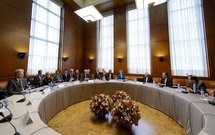 There is great buzz in the international community with respect to the recent developments to resume diplomatic relations between the great powers and Iran for reaching a deal on Iranian nuclear programme. Expectations are high, as Iran is now presumed to be lead by pragmatists who want to end its isolation by mending international relations.
There is great buzz in the international community with respect to the recent developments to resume diplomatic relations between the great powers and Iran for reaching a deal on Iranian nuclear programme. Expectations are high, as Iran is now presumed to be lead by pragmatists who want to end its isolation by mending international relations.
However the recent Geneva meeting between the P5+1 and Iran has been viewed and assessed by different players quite differently. In this light, we observe how major actors are reacting to the shift in Iranian foreign policy and how it will affect the future course of the dialogue.
Not a Very Happy Picture
Although the recent talks portray that a lot has changed with regard to Iran’s foreign policy, there are some who are not very happy and convinced about the change in atmosphere.
The US Congress is playing heavy in the diplomatic dance between the US and Iran. There are many members of the Congress who believe that the only way to deal with Iran is to put more pressure as it seems to have worked so far.
The proposed sanctions bill which is ready to go before the Senate over the course of the next few weeks, passed by an overwhelming majority of the US Congress, was put to a brief pause to avoid spoiling the first bargaining session in Geneva. However, they plan to move forward with the bill in the coming weeks.
The Israelis are very nervous about the proceedings. "Netanyahu ultimately fears the success of diplomacy, not its failure," explains Trita Parsi, founder and president of the National Iranian American Council, in Foreign Affairs (Pushing Peace, 1 Oct 2013). The Israelis fear that the smoothening of ties between the US and Iran might cast its shadow over Israel-US relations.
They fear that once the nuclear issue between the two nations is resolved or contained, Washington will start focusing on Iran more, leaving Israel in the region with a hostile Iran. Yuval Steinitz, Israel’s minister for intelligence and strategic affairs, confirmed that Israel is alarmed by what he called Rouhani’s ‘smiley campaign’. “On the one hand, Iran is trying to appease the world with Rouhani’s moderate rhetoric. And on the other hand, Iran continues its approach toward nuclear weapons, and if nothing serious will be done, Rouhani will continue to smile, will continue to appease, and he will smile all the way to the bomb.”
Iran is also viewed with mistrust by its close neighbours, notably the Gulf States mainly because of the bitter history that they share and the cultural divide that separates the Sunni and the Shiite worlds. The growing influence that Iran has gained in Iraq helps us predict that a similar trend could be observed in western Afghanistan after US departure.
There is a growing concern amongst West Asian states about this increasing Iranian aggressiveness in the region. The Gulf States are sensing US disinterest in being drawn into the regional problems of West Asia and are perhaps wondering who will give them the kind of support they have time and again received from the US. If the Iranian deal takes place it is only likely to accelerate the disconnect betwenn the US and Western powers from the region.
This can also come as a bigger challenge for the US as it may result in a shifting of international balance of power in this part of the world with US influence waning and China quietly moving in. Given its ever increasing need for resources and the capacity of the region to fulfil its appetite, China can play a major role in the years to come. However this is just a presumption, it is too early to comment further in this regard taking into consideration instability in the Arab world and the unpredictable nature of West Asia.
How does this Reflect upon Future Talks?
The Obama administration wants the Congress to hold off on passing fresh sanctions on Iran until after the next round of talks. However the strong Jewish lobby in Washington is pushing to go forward with new and enhanced Iran sanctions. This will have its implications as the talks proceed.
Iran faces hostilities from both within and outside the region, but still it seems positive about moving further with the second round of negotiations in November irrespective of the pressure building up. It is hard to make predictions with Iran but the new tone sounds promising. It is important to remember that these are just the first steps towards tangible signs of change within the country. What is clear as of now is that Rouhani wants to rehabilitate Iran’s stand, find some sort of a solution to the nuclear mess and fix its crippling economy.
However this is just a beginning. Beginnings are rarely ground breaking because both parties are putting pieces on the table in the first round of negotiations. Everybody is laying down in some detail what their interests are. The negotiations in New York and Geneva show that both sides are empowered, prepared and willing.
Courtesy : Institute of Peace and Conflict Studies (http://www.ipcs.org)